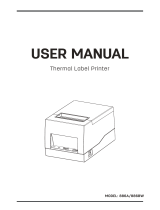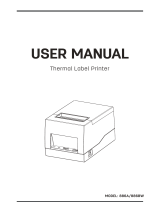
15
(3) The auto-cutter cuts the receipt paper immediately when printing is finished.
(4) The printer automatically goes into data receipt mode after finishing the
self-check printing process.
4.4 Preventive Maintenance
This printer has been developed to have a long life expectancy with no
replacement of components and minimum user interference. But printer
lifetime is highly influenced by the following factors: paper quality, regular
preventive maintenance, environmental conditions and how carefully the user
handles this product.
(1) During normal operation some ink particles from the thermal paper will
adhere to the thermal print head surface. Therefore, it is recommended to
clean the printer head after 10 km of printed length or if printing quality is
degrading. Switch off the printer before cleaning it. Clean the print head with
a cotton swab, soaked with alcohol solvent (ethanol or isopropanol). Do not
clean the print head with hard, abrasive objects or your fingers, since this can
cause damage to its delicate surface. Clean the platen roller (rubber roller)
with the cotton swab to remove any dust particles.
CAUTION!
The print head can be hot just after printing. Do not touch the print head;
let it cool down before touching and cleaning. Because the thermal
elements of the print head and driver IC are fragile, avoid touching them
with any metal objects or any abrasive material.
(2) During normal operation paper particles will build up inside the printer. This
is normal, but dust and paper particles can prevent the sensors from
functioning properly. To avoid that, verify once a year that the sensor surfaces
are unobstructed. To remove small paper particles from the sensors, use a
small brush to wipe off the dust and paper particles. Do not attempt to use
liquids to clean the sensors, in order to avoid damage.
(3) The cutter is manufactured with hardened steel for maximum wear resistance.
It is normal to have some dust buildup in the blades and this will not affect
cutter performance.
(4) Clean the external cabinet with a soft cloth, moistened in water or neutral
detergent. Never use a tow chemically treated or chemical substances like
alcohol or similar solvent. The use of these products can make the cabinet of
the printer changes its color or be deformed.






















